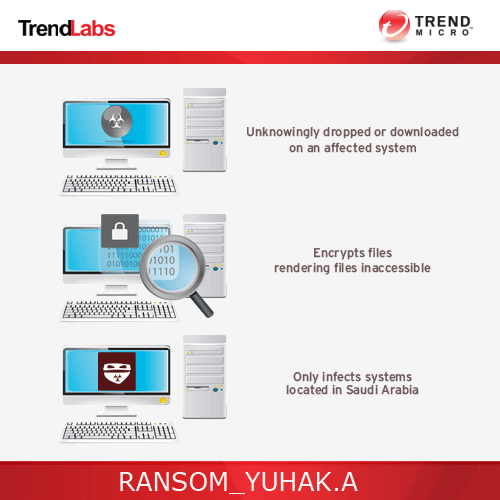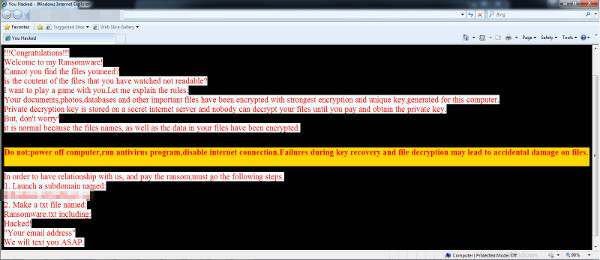RANSOM_YUHAK.A
Windows


Threat Type: Trojan
Destructiveness: No
Encrypted: No
In the wild: Yes
OVERVIEW
This malware was discovered late January 2017 and has been found to affect systems it detects to be in Saudi Arabia. It encrypts .EXE and .COM files it detects on the affected system. Users affected by this malware may find their documents inoperable due to its encrypting routines that can potentially lead to data corruption/system file damage.
To get a one-glance comprehensive view of the behavior of this Trojan, refer to the Threat Diagram shown below.

This Trojan arrives on a system as a file dropped by other malware or as a file downloaded unknowingly by users when visiting malicious sites.
TECHNICAL DETAILS
Arrival Details
This Trojan arrives on a system as a file dropped by other malware or as a file downloaded unknowingly by users when visiting malicious sites.
Installation
This Trojan drops a copy of itself in the following folders using different file names:
- {root drive}:\services.exe - set attributes to Hidden
It drops the following files:
- %Windows%\pass - set attributes to Hidden
- %Desktop%\zXz.html - Ransom Note
(Note: %Windows% is the Windows folder, where it usually is C:\Windows on all Windows operating system versions.. %Desktop% is the desktop folder, where it usually is C:\Documents and Settings\{user name}\Desktop in Windows 2000, Windows Server 2003, and Windows XP (32- and 64-bit); C:\Users\{user name}\Desktop in Windows Vista (32- and 64-bit), Windows 7 (32- and 64-bit), Windows 8 (32- and 64-bit), Windows 8.1 (32- and 64-bit), Windows Server 2008, and Windows Server 2012.)
It adds the following mutexes to ensure that only one of its copies runs at any one time:
- Services1.0
Other System Modifications
This Trojan modifies the following registry entries:
HKEY_CURRENT_USER\Software\Microsoft\
Windows NT\CurrentVersion\Windows
Load = {root drive}:\services.exe
Process Termination
This Trojan terminates processes or services that contain any of the following strings if found running in the affected system's memory:
- Task Manager
- Windows Task Manager
- outlook
- exchange
- sql
- MSSQLSERVER
- SQLWriter
- MSSQL$CONTOSO1
- SQLServerAgent
- MSSQL$SQLEXPRESS
- Microsoft Exchange Information Store
- OracleASMService+ASM
- OracleCSService
- OracleServiceORCL
- OracleOraDb10g_home1TNSListener
- usermanager
Other Details
This Trojan does the following:
- This malware truncates files with certain file extensions to zero bytes:
- .3gp
- .7z
- .accdb
- .ace
- .ai
- .ashx
- .asmx
- .asp
- .aspx
- .bad
- .bak
- .bat
- .bdp
- .bdr
- .bkf
- .bmp
- .c
- .cfg
- .cmd
- .cmsc
- .cpp
- .cs
- .csv
- .dat
- .db
- .dbf
- .doc
- .docx
- .dwg
- .dxf
- .edb
- .edx
- .efp
- .eml
- .epf
- .ese
- .exe
- .flv
- .fmb
- .gz
- .img
- .ipdb
- .iso
- .issue
- .jar
- .java
- .jpg
- .kdbx
- .kmz
- .ldf
- .lic
- .log
- .max
- .mdb
- .me
- .mkv
- .mpp
- .mtb
- .olb
- .ost
- .png
- .pps
- .ppsx
- .ppt
- .pptx
- .psc
- .psd
- .pst
- .rar
- .rdp
- .resx
- .rmvb
- .rtf
- .sdb
- .sln
- .soap
- .sql
- .stm
- .svc
- .swf
- .tar
- .txt
- .vdw
- .vdx
- .vmdk
- .vsd
- .war
- .webm
- .xls
- .xlsm
- .xlsx
- .xlt
- .zip
NOTES:
The Ransom note contains the following:

SOLUTION
Step 1
Before doing any scans, Windows XP, Windows Vista, and Windows 7 users must disable System Restore to allow full scanning of their computers.
Step 2
Note that not all files, folders, and registry keys and entries are installed on your computer during this malware's/spyware's/grayware's execution. This may be due to incomplete installation or other operating system conditions. If you do not find the same files/folders/registry information, please proceed to the next step.
Step 3
Restart in Safe Mode
Step 4
Delete this registry value
Important: Editing the Windows Registry incorrectly can lead to irreversible system malfunction. Please do this step only if you know how or you can ask assistance from your system administrator. Else, check this Microsoft article first before modifying your computer's registry.
- In HKEY_CURRENT_USER\Software\Microsoft\Windows NT\CurrentVersion\Windows
- Load = {root drive}:\services.exe
- Load = {root drive}:\services.exe
Step 5
Search and delete this file
- %Windows%\pass
- %Desktop%\zXz.html
Step 6
Restart in normal mode and scan your computer with your Trend Micro product for files detected as RANSOM_YUHAK.A. If the detected files have already been cleaned, deleted, or quarantined by your Trend Micro product, no further step is required. You may opt to simply delete the quarantined files. Please check this Knowledge Base page for more information.
NOTES:
Perform this as Step 7 for the solution.
Restore damaged files from backup.
Did this description help? Tell us how we did.


